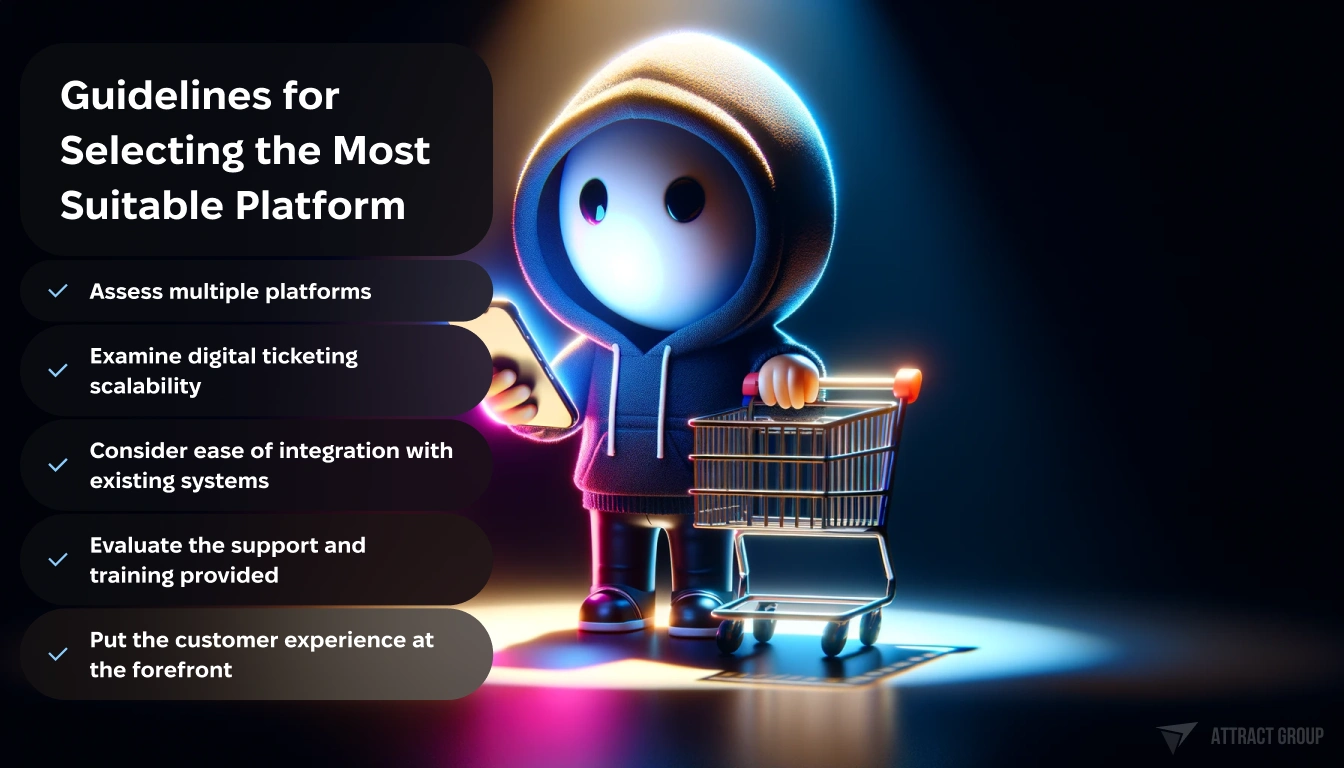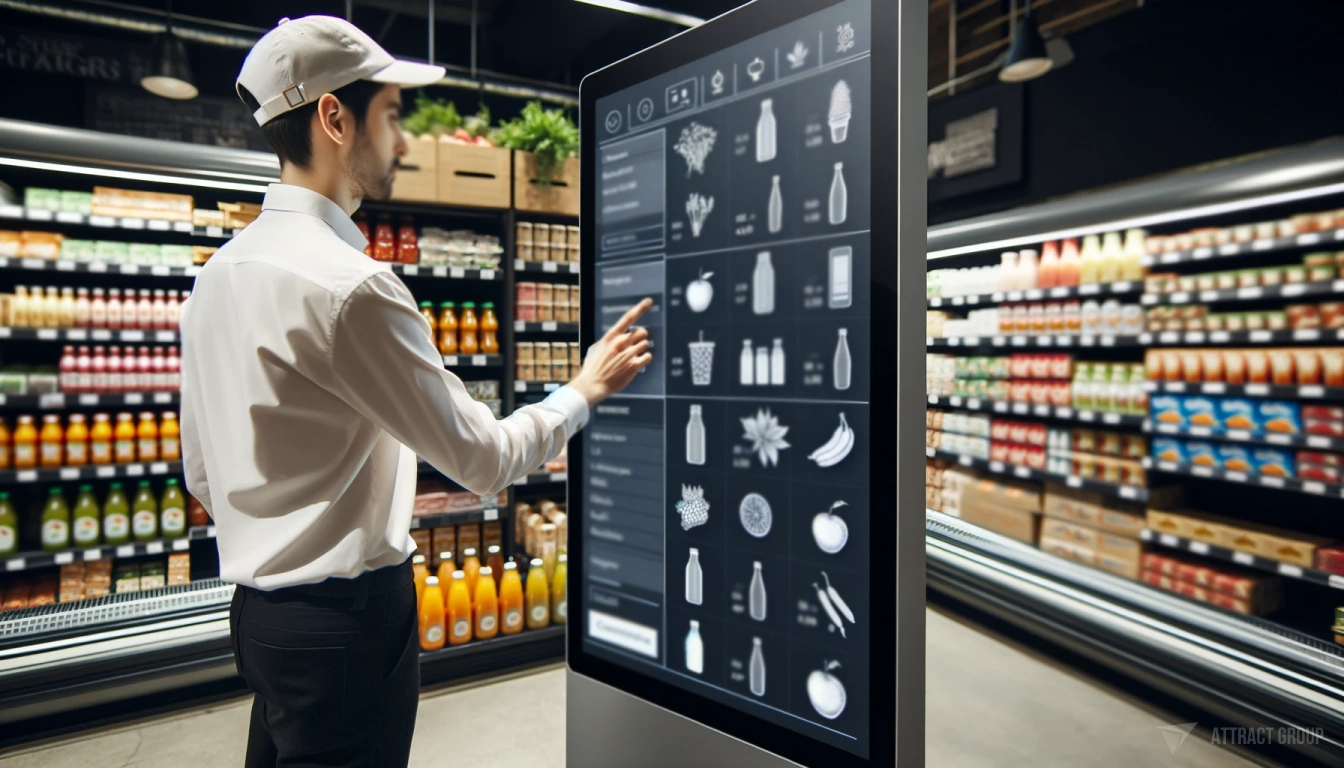Comparing Digital Ticket Platforms for Retail Industry
 1 February 2024
1 February 2024? Listen to the Summary of this article in Audio
The shift towards digitalization has fundamentally altered the retail landscape, with digital ticketing for retailers becoming a normative practice. Far removed from the cumbersome methods of traditional ticket systems, today’s retail digital ticket solutions offer seamless, integrated experiences for both consumers and retailers alike. By leveraging cutting-edge ticketing software for retail, businesses are able to manage their dynamic pricing strategies and maintain an accurate picture of their inventory in real-time — key factors in our fast-paced market.
The conversation on digital vs traditional ticketing is becoming increasingly vital as retailers strive to enhance their operational efficiency and customer engagement. Success in this area depends largely on the level of ticketing solution integration across sales channels that a business is able to achieve. The right choice of digital ticket platform could very well determine the extent to which a retailer can outmaneuver the competition and secure its place at the forefront of retail innovation.
Key Takeaways
- The move to digital ticket platforms ensures updates occur in real-time across multiple sales channels.
- Digital ticketing for retailers is critical for implementing dynamic pricing strategies.
- Choosing the right digital ticket solution is paramount for competitiveness in the retail sector.
- Ticketing software for retail enhances customer experience through streamlined integration and usability.
- Retailers must consider digital vs traditional ticketing to stay relevant and responsive to market trends.
Key Features of E-ticketing Platform for Retailers
As the retail industry ventures deeper into the digital age, the features of e-ticketing platforms have emerged as pivotal factors in streamlining sales and ensuring an extraordinary customer journey. Advanced e-ticketing systems go beyond mere transactional processes; they embody a multi-faceted solution, adept at meeting complex retail demands. The integration of these platforms affects not just consumer convenience but also the operational dexterity of retailers in a competitive marketplace.

Multi-channel Selling and Distribution
The cornerstone of modern e-ticketing platform features is the ability to extend the retail experience across various channels. True multi-channel functionality encapsulates not only a physical box office presence but also integrates online and mobile sales, each synchronized for real-time accuracy and accessibility. This cross-channel fluidity contributes to the ubiquitous availability of tickets, ensuring consumers can interact with the retailer through their preferred medium, thus optimizing overall ticketing platform usability.
Payment Processing and Security Measures
At the heart of any e-ticketing service, payment processing must be robust, reliable, and multifaceted. High-caliber platforms offer a versatile mix of payment methods, including the traditional credit/debit cards, alongside digital wallets like PayPal. Simultaneously, ticketing platform security is not to be sidelined; employing state-of-the-art encryption and compliance with industry standards, reputable e-ticketing platforms guard all financial transactions and sensitive customer data against potential breaches.
Event Analytics and Customer Data Management
To complete the ensemble of essential e-ticketing platform features, robust event analytics and insightful customer data management play a vital role. The capacity to collect and analyze event performance metrics grants retailers the intelligence needed to make informed decisions. Furthermore, a nuanced understanding of customer preferences derived from data management tools aids in creating targeted marketing campaigns, thereby elevating the level of personalization in customer engagements—a testament to the ticketing platform usability.
Comparing Ready-Made and Custom-Built Solutions
The decision to adopt a digital ticketing system within the retail industry comes with the pivotal choice between opting for a custom vs standard ticketing system. While some retailers may find solace in the plug-and-play nature of off-the-shelf options promising swift implementation, others may lean towards a more personalized touch, choosing ticketing system customization for a tailored fit to their unique business needs. As retailers scrutinize their options, they must balance the aspiration for ticketing platform efficiency with strategic business goals and customer satisfaction benchmarks.
Pros and Cons of Customization
Delving into custom ticketing systems unearths a spectrum of advantages, notably the perfect alignment with business processes, offering a genuine extension of the brand’s ethos and enhancing customer experiences. Customization facilitates precise integration with existing legacy systems and adapts smoothly to evolving business strategies. However, these bespoke solutions come not only with a higher initial investment but also necessitate extended developmental timelines and demand dedicated resource allocation for ongoing maintenance.

- More granular control over features and user experience
- Greater scalability to accommodate future expansion
- Potential for competitive advantage through unique offerings
- Higher upfront costs and longer time to market
- Requires specialized expertise for development and support
When to Choose Off-the-Shelf Ticketing Software
In contrast, standard ticketing systems are often favored for their cost-effectiveness and rapid deployment capabilities. They generally come equipped with a suite of essential features vetted by a broad user base. For retail entities aspiring quick market entry or those operating within a restrictive budget, these ready-made solutions can offer surprising agility with periodic updates managed by the provider—freeing up resources to focus squarely on core business functions.
- Lower initial investment and quick deployment
- User-tested features and regular updates without in-house development
- Generally includes support and maintenance in the package
- Might lack specific features needed for unique business models
- Less flexibility for integration with proprietary systems or niche processes
The right choice between a custom and a standard ticketing system often hinges on a critical assessment of the retailer’s current and anticipated needs, the strategic value of bespoke functionality for customer engagement, and an honest evaluation of internal competencies to support the chosen solution long-term.
The Advantages of Custom-Built Ticketing Solutions
Embracing retail ticketing innovation, custom-built ticketing platforms offer tailored solutions that have become instrumental in the transformation of retail industries. Retailers aiming to differentiate themselves in the market are increasingly opting for these custom solutions, reaping benefits such as increased efficiency, a greater alignment with their brand values, and elevated customer engagement. The strategic decision of choosing the right ticketing platform involves detailed considerations about how these systems will meld with and enhance existing retail operations.
Key Considerations
As with any significant retail innovation, deciding to employ a custom-built ticketing system necessitates a thorough evaluation of the retailer’s specific needs. Key considerations include the unique characteristics of a business’s operations, the various touchpoints that engage customers throughout their buying journey, and the need to maintain a seamless experience at scale. The efficiency of custom-built systems lies in their ability to be perfectly attuned to strategic business imperatives and customer satisfaction goals.
Integration Differences with Existing Retail Systems
Unlike ready-made solutions, custom-built ticketing platforms are designed with the flexibility to dovetail with existing retail systems. This seamless integration ensures that all components of the sales and management process work in harmony, achieving a higher standard of operational efficiency. For retailers with complex requirements or those looking to maintain a competitive edge, custom systems can provide a cohesive infrastructure that supports both current functionalities and future technological expansions.
| Feature | Custom-Built Solution | Ready-Made Solution |
|---|---|---|
| Customization Level | High, tailored to specific business workflows | Low to moderate, general features that fit a wide range of users |
| Integration with Existing Systems | Seamlessly integrated, enhancing current infrastructures | May require additional modifications or updates for compatibility |
| Scalability | Designed for future expansion and adaptability | Limited by pre-existing structures and update cycles |
| Cost | Higher initial investment but lower long-term costs | Lower upfront costs but potential for higher ongoing expenses |
| Time to Market | Longer due to development, but highly adaptive post-deployment | Shorter initial deployment, with possible delays for future custom needs |

Comparing Digital Ticket Platforms
In the retail industry, the evolution of customer service and sales has been significantly impacted by the rise of digital ticketing platforms. When we compare ticketing software, it’s essential to scrutinize the features, cost-effectiveness, and how these solutions fit into the current retail digital ticketing trends. This comparative analysis focuses on identifying the top platforms in the market, discussing their unique offerings, and dissecting the advantages and limitations inherent to each system. The aim is not only to conduct a detailed retail ticketing system comparison but also to provide insights into the best use cases for each platform, enabling retailers to make informed choices that align with their specific needs.
Overview of Most Popular Platforms
The digital ticketing sphere hosts a variety of platforms, each with its own set of strengths. Among the popular contenders, AudienceView appeals to nonprofits and art centers, while TicketSpice is acclaimed for its affordability and ease of use. ThunderTix gains recognition for its specialized services for the performing arts, and solutions like Tix and Clubspeed cater to versatile ticketing and venue management needs. The retail sector can benefit from assessing these platforms as part of its cost analysis of ticketing systems, ensuring they invest in tools that meet their business scale and scope.
Feature Comparison Table
| Features | AudienceView | TicketSpice | ThunderTix | Tix | Clubspeed |
|---|---|---|---|---|---|
| Cloud-Based | Yes | Yes | Yes | Yes | Yes |
| Fundraising Integration | Yes | Limited | No | No | No |
| Multi-Location Support | Yes | No | Yes | Yes | Yes |
| Real-Time Sales Analytics | Yes | Yes | Yes | Yes | Limited |
Pros and Cons Analysis
Each ticketing platform boasts a unique set of pros and cons. AudienceView provides extensive ticketing management and fundraising options, but may come with a steeper learning curve. TicketSpice offers an affordable pricing model at the cost of fewer integrations. ThunderTix excels in reserved seating options and analytics but lacks fundraising tools. Tix serves a variety of ticketing needs while maintaining affordability, though some users may require additional customization. Clubspeed, providing robust venue management, may not be as tailored for event-centric organizations that require advanced ticketing analytics.
Best Use Cases for Most Popular Platforms
Understanding the best use cases for these platforms is essential to choosing the right ticketing system. AudienceView, with its powerful seat management and fundraising capabilities, is well-suited for theaters and museums. TicketSpice, being cost-effective with a simple interface, is ideal for small to mid-sized events. ThunderTix is the platform of choice for the performing arts sector, thanks to its subscription and donor management features. Tix is versatile and can be leveraged by a wide range of event organizers, particularly those who desire a balance of functionality and affordability. Clubspeed finds its strength in venues with additional entertainment offerings like VR experiences and go-kart tracks, where managing the entire customer experience is crucial.
Making the Right Choice for Your Retail Business
As a retailer, harnessing the power of the ideal digital ticketing platform bears strategic significance that goes beyond the mechanics of ticket sales. It’s a choice that casts a long shadow over the future scalability of your business, impacting customer satisfaction and your bottom line. Choosing the right ticketing platform is no simple task, as it involves weighing a myriad of features against your retail goals. Yet, the potential rewards justify the effort, promising unparalleled growth and customer engagement.
Guidelines for Selecting the Most Suitable Platform
Selecting a platform that dovetails with your retail business’s objectives requires a structured approach. When conducting a retail ticketing system comparison, focus on how a system scales to meet the surge of growth is essential, as digital ticketing scalability ensures that the system expands as your business does. Another critical factor is the system’s compatibility with your existing services, ensuring a seamless transition and integration with your current operational framework.
- Assess multiple platforms to understand the variety and scope of features they offer.
- Examine digital ticketing scalability to ensure your choice can handle business growth.
- Consider ease of integration with existing systems and potential for disruption.
- Evaluate the support and training provided, as effective utilization hinges on thorough understanding.
- Put the customer experience at the forefront, choosing features that align with your service portfolio.

Emphasizing the Strategic Importance of the Right Choice
The strategic value of choosing the most fitting ticketing platform cannot be understated. A decision of this magnitude can propel a retail business forward or hinder its progress. The right system not only streamlines operations but also amplifies revenue opportunities. It acts as the conduit between your offerings and customers, transforming the ticket purchasing experience into a touchpoint for brand loyalty and enhanced engagement.
Commit to a platform that not only meets immediate needs but also foresees and adapts to future industry shifts. Ensure that your choice is a reflection of your business’s ethos as well as a testament to its agility in the dynamic retail marketplace.
| Consideration | Impact on Retail Business |
|---|---|
| Scalability | Ensures the platform can grow with increased demand and business expansion |
| Feature Congruity | Aligns platform capabilities with current services offered to maintain operational consistency |
| Integration Compatibility | Allows for smooth adoption within the existing technological ecosystem, mitigating transition challenges |
| Customer Experience | Directly influences customer satisfaction levels and potential for market differentiation |
| Strategic Value | Affects long-term business performance and opportunity for innovation |
Comparing Cost Analysis of Ticketing Systems for Retailers
When selecting a ticketing system, retailers must understand the array of expenses involved. Total cost ownership extends beyond the price of software licenses. It encapsulates several financial aspects that collectively influence the overall economic footprint of ticketing systems for retailers. Close examination of both overt and covert expenses is key to ensuring the chosen solution presents a favorable long-term investment.
Understanding the Total Cost of Ownership
A comprehensive cost analysis of ticketing systems does not stop at the initial price tag. It includes an array of cost-incurring factors that could affect the retailer for the lifespan of the system. Evaluating total cost of ownership means examining long-term expenses such as technical upgrades, system maintenance, staff training, and customer support services. Ticketing system reliability over time directly impacts these costs—reliable systems may induce fewer updates and maintenance requirements.
Hidden Costs in Digital Ticketing Platforms
Hidden costs in ticketing platforms are often overlooked during the procurement process. These include transaction fees, payment processing charges, costs associated with third-party integrations, and expenses resulting from any scalability needs that may arise. Retailers must be vigilant in identifying these hidden costs as they have the potential to substantially increase expenditure over time, thereby affecting the profitability and budgeting within the retail operation.
| Cost Factor | Description | Impact on Retailers |
|---|---|---|
| Upfront Fees | Initial purchase price or subscription costs | Directly affects initial budgeting and investment decisions |
| Integration Expenses | Cost to integrate with existing retail systems and databases | Essential for seamless adoption; involves technical and labor costs |
| Maintenance and Support | Ongoing system maintenance and customer support fees | Crucial for ticketing system reliability and longevity |
| Training Costs | Resources spent on educating staff to use the system effectively | Ensures efficient operation and maximizes the investment return |
| Scaling Costs | Costs associated with adjusting system capabilities to business growth | Affects long-term operational flexibility and market responsiveness |
| Transaction Fees | Per-transaction costs charged by the platform or payment processors | Can accumulate significantly, affecting per-sale profit margins |

As retail businesses contemplate integrating digital ticketing systems, grasping the full spectrum of costs involved will unlock a more strategic and economically sound choice. Informed decisions driven by thorough cost analysis may well be the fulcrum upon which retail success pivots in the ever-evolving digital marketplace.
Conclusion
The quest to optimize user experience in ticketing platforms for retail businesses spurs a relentless drive to choose the best digital ticketing solutions. In charting the course for success, retailers must weigh the final recommendations for ticketing platforms with a discerning eye, looking beyond immediate needs to embrace future potentials. Engaging in a robust evaluation that measures features against scalability, and cost against customization, provides the bedrock for a strategically sound decision.
Choosing the Right Ticketing Platform: Final Recommendations
Our meticulous analysis offers final recommendations for ticketing platforms, tailored to fortify the retail realm. The key lies in prioritizing platforms that align with your business’s ethos while ensuring unmatched transaction ease and stringent security. Such a platform not only catalyzes customer loyalty but also amplifies the potential for sustained business prosperity. Retailers are thus urged to seek out ticketing partners that provide comprehensive support and foster a seamless, intuitive user experience – elements that stand as cornerstones in the competitive retail landscape.
Future Projections for Digital Ticketing in the Retail Sector
As we cast our gaze forward, the future of digital ticketing in retail promises advancements that will redefine the standards for customer engagement. Retailers should remain agile, ready to adapt and implement emerging technologies that can propel the shopping experience into new echelons of personalization and convenience. Staying attuned to digital ticketing trends will ensure not only relevance but a pioneering stance, equipping retailers to meet and exceed the ever-evolving expectations of their consumers.
FAQ
What are the benefits of transitioning from traditional to digital ticketing for retailers?
Digital ticketing for retailers enhances customer experience by streamlining the purchasing process, providing real-time updates on pricing and inventory across multiple sales channels, and allowing for more efficient management strategies. It also supports dynamic pricing strategies and improves inventory management.
What key features should an e-ticketing platform offer to retailers?
An efficient e-ticketing platform for retailers should include multi-channel selling and distribution capabilities, robust payment processing and security measures, and advanced event analytics and customer data management tools. These features enhance customer experience and provide valuable insights for the retailer.
What are the differences between custom-built and ready-made ticketing solutions?
Custom-built ticketing solutions are tailored to a retailer’s specific needs and can integrate seamlessly with existing systems, providing unique operational benefits. Off-the-shelf solutions typically offer lower upfront costs, faster deployment, and regularly updated features without in-house development.
How can custom-built ticketing solutions benefit retailers?
Custom-built ticketing solutions afford the opportunity for innovation and uniqueness in the market. They provide a perfect fit for a retailer’s operations, enhance customer engagement strategies, and support long-term growth objectives with seamless integration with existing systems.
What factors should retailers consider when comparing digital ticket platforms?
Retailers should evaluate the scalability, features, integration capabilities, and cost-effectiveness of each platform. They should also look into the specific services, like fundraising and multi-location event support, and the overall usability and security of the systems when making a comparison.
How crucial is the choice of a digital ticketing platform for a retail business?
Choosing the right digital ticketing platform is strategically important as it influences not just the efficiency of sales and distribution processes but also customer satisfaction, security, and the potential for revenue growth.
What are the considerations for cost analysis when selecting a ticketing system for retail?
Retailers must consider the total cost of ownership, including upfront fees, subscription costs, implementation, training, and maintenance over time. It’s also important to be aware of hidden costs such as transaction fees and costs associated with third-party integrations.
What should retailers expect for the future of digital ticketing?
Retailers should anticipate continued innovation and a trend toward further digitization in the ticketing space. The focus is likely to be on improving user experience, transaction ease, security, and integration capabilities to keep pace with evolving consumer expectations.










